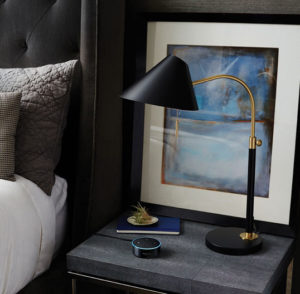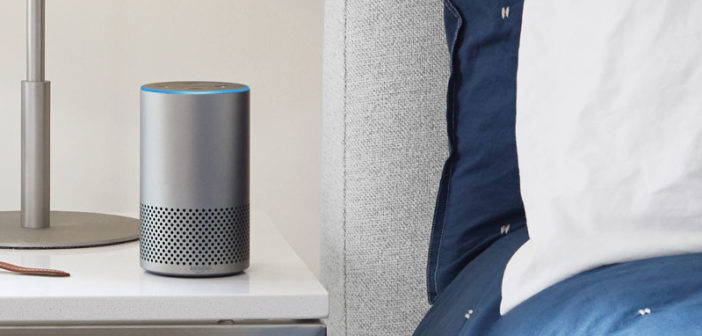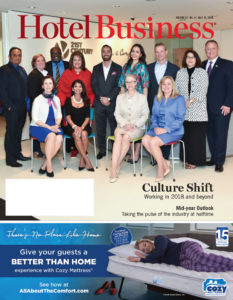SEATTLE—Hotels have been experimenting with voice-activated controls for a while now, with hotels from brands ranging from select-service Aloft to full-service Wynn testing the technology at their properties. Now, one of the companies that’s a driving force behind voice technology in the consumer marketplace—Amazon—is betting on hotels with the launch of Alexa for Hospitality. Offered by invitation, hotel guests now have another way they can feel at home while traveling to hotels, vacation rentals and other hospitality locations.
According to the company, Alexa for Hospitality will enable hotels to strengthen guest engagement with new ways for guests to access services and amenities during their stay. And, certainly, that’s been an aim for smart hoteliers who realize that they can’t force guests to engage with them through whatever channel the hotel prefers; rather, hoteliers need to be available to guests through whatever method they desire in that moment.
“Customers tell us they love how easy it is to get information, enjoy entertainment and control connected devices by simply asking Alexa, and we want to offer those experiences everywhere customers want them,” said Daniel Rausch, VP, Amazon. “Alexa for Hospitality makes your hotel stay a little more like being at home and gives hospitality providers new ways to create memorable stays for their guests.”
Marriott International Inc. will introduce the platform in select properties across the Marriott Hotels, Westin Hotels & Resorts, St. Regis Hotels & Resorts, Aloft Hotels and Autograph Collection Hotels brands, starting this summer.
According to Jennifer Hsieh, VP of customer experience innovation with Marriott International, this is the next logical step for the company. “Marriott has a long track record of innovating for our guests, and we’re thrilled to be among the first to offer Alexa for Hospitality,” she said. “So many of our guests use voice technology in their home, and we want to extend that convenience to their travel experience.”
Noting that Charlotte Marriott City Center and Marriott Irvine Spectrum will be among the first to experience a curated list of Alexa for Hospitality features, she said, “We will be evaluating guest feedback and adoption to inform how we expand the skills, features and functionality offered through Alexa in our hotels.”
The introduction of the device for hospitality is a game-changer, said Noreen Henry, CEO of WayBlazer, an AI-powered travel recommendation engine. ”Marriott’s partnership with Amazon signals the beginning of the eventual wide-scale adoption of voice assistants in the travel and hospitality industry,” she said.
What sets Alexa for Hospitality apart from a home Amazon Echo is that hoteliers can enable and customize a range of voice-first features based on their guests’ needs. Need the on-property restaurant hours or the fitness center location? Fancy ordering a cheeseburger and fries from the room service menu? Want extra towels for the room? Alexa for Hospitality can do all of that.
Like at home, the device can also be configured to allow guests to control and adjust in-room devices like lights, thermostats, blinds and TVs to their individual preferences—or just for the guest who gets into bed at night before turning off the lights—or ask Alexa to play music from services including iHeartRadio and TuneIn. Hotels can select the default music stations from iHeartRadio—Marriott has its own curated station—as a way to support and further their branding and aesthetic.
 Other skills available on the platform include the ability to check airport wait times, play games, get in a quick guided workout or play white noise to help guests fall asleep. Hotels can also connect to custom skills that are only available to their guests. For example, Marriott has a partnership with TED, so guests at Alexa-enabled properties can request TED Talks.
Other skills available on the platform include the ability to check airport wait times, play games, get in a quick guided workout or play white noise to help guests fall asleep. Hotels can also connect to custom skills that are only available to their guests. For example, Marriott has a partnership with TED, so guests at Alexa-enabled properties can request TED Talks.
And soon, Alexa for Hospitality will add another feature for hotel guests: the ability to temporarily connect their Amazon account to the in-room Alexa device. This will enable them to play their carefully curated playlists from services like Spotify, Pandora, and, of course, Amazon Music, as well as listen to audiobooks with Audible. Upon checkout, the personal account will automatically be disconnected from the in-room device.
Guests are not required to share their information with Amazon to use the device. “With Alexa for Hospitality, guests don’t need to share personal information with Amazon to use Alexa in their hotel room, nor does the hotel need to provide guest information to Amazon,” an Amazon spokesperson told Hotel Business.
Recognizing that some hotel guests will have concerns about privacy, the Amazon rep explained, “A hotel cannot access voice recordings of what a guest says or Alexa’s response to a guest’s request, and Amazon cannot link voice recordings to individual guests. Voice recordings will be automatically deleted daily.”
Every Amazon Echo device offers multiple layers of privacy protection, according to the spokesperson. “After hearing the guest say ‘Alexa,’ an Echo device provides a visual indicator to let the guest know Alexa is processing a request, and guests can disable Alexa’s ability to hear and respond to the wake word at any time simply by pressing the mute button on top of the Echo device in their room,” the rep said.
Additionally, Marriott reports that if a guest does not want to have an Echo device in the room, it can be removed at their request.
According to the company, installation is a quick job for hotels as the devices can be up and running in minutes. Additionally, the platform is designed to work with existing hotel technologies, which cuts down on the need to retrofit or upgrade existing investments, a common problem hoteliers often face with hotel technology. Partners include DigiValet, Intelity, Nuvola and Volara.
Alexa for Hospitality also works with guestroom entertainment providers World Cinema and GuestTek for voice control of TV experiences, and in-room control of connected devices using Crestron and Inncom by Honeywell.
Juan Carlos Abello, CEO and founder of Nuvola, said that guests aren’t the only ones who will benefit from Alexa. “On the staff side, if you’re inspecting the room and see the remote control is not working, you can tell that to Alexa and it will create an internal request,” he said. “The staff members are able to speak to the device, too.”
Other advantages for hotels include the ability to limit volume level, administrator notifications if a device goes offline and the ability to measure engagement through analytics and adapt services based on guest feedback. HB


